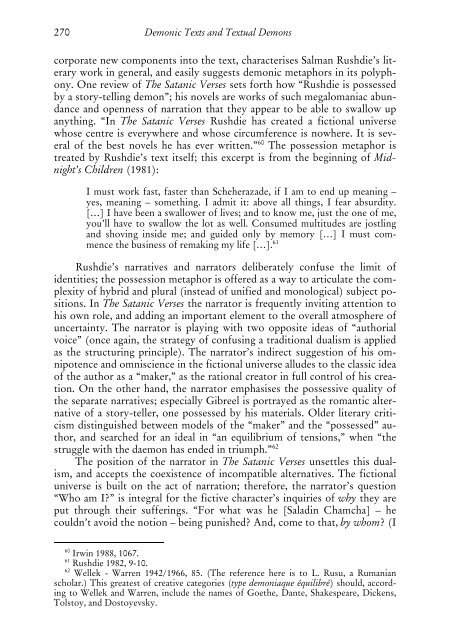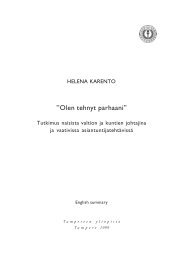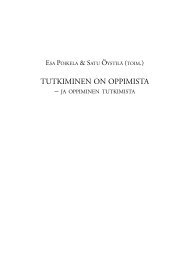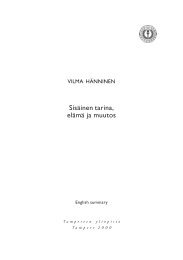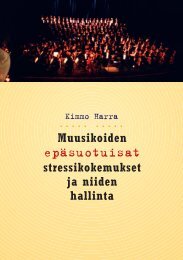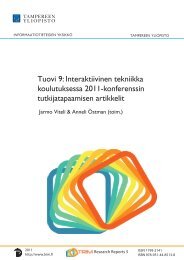Note on this edition: this is an electronic version of the 1999 book ...
Note on this edition: this is an electronic version of the 1999 book ...
Note on this edition: this is an electronic version of the 1999 book ...
You also want an ePaper? Increase the reach of your titles
YUMPU automatically turns print PDFs into web optimized ePapers that Google loves.
270Dem<strong>on</strong>ic Texts <strong>an</strong>d Textual Dem<strong>on</strong>scorporate new comp<strong>on</strong>ents into <strong>the</strong> text, character<strong>is</strong>es Salm<strong>an</strong> Rushdie’s literarywork in general, <strong>an</strong>d easily suggests dem<strong>on</strong>ic metaphors in its polyph<strong>on</strong>y.One review <strong>of</strong> The Sat<strong>an</strong>ic Verses sets forth how “Rushdie <strong>is</strong> possessedby a story-telling dem<strong>on</strong>”; h<strong>is</strong> novels are works <strong>of</strong> such megalom<strong>an</strong>iac abund<strong>an</strong>ce<strong>an</strong>d openness <strong>of</strong> narrati<strong>on</strong> that <strong>the</strong>y appear to be able to swallow up<strong>an</strong>ything. “In The Sat<strong>an</strong>ic Verses Rushdie has created a ficti<strong>on</strong>al universewhose centre <strong>is</strong> everywhere <strong>an</strong>d whose circumference <strong>is</strong> nowhere. It <strong>is</strong> several<strong>of</strong> <strong>the</strong> best novels he has ever written.” 60 The possessi<strong>on</strong> metaphor <strong>is</strong>treated by Rushdie’s text itself; <strong>th<strong>is</strong></strong> excerpt <strong>is</strong> from <strong>the</strong> beginning <strong>of</strong> Midnight’sChildren (1981):I must work fast, faster th<strong>an</strong> Scheherazade, if I am to end up me<strong>an</strong>ing –yes, me<strong>an</strong>ing – something. I admit it: above all things, I fear absurdity.[…] I have been a swallower <strong>of</strong> lives; <strong>an</strong>d to know me, just <strong>the</strong> <strong>on</strong>e <strong>of</strong> me,you’ll have to swallow <strong>the</strong> lot as well. C<strong>on</strong>sumed multitudes are jostling<strong>an</strong>d shoving inside me; <strong>an</strong>d guided <strong>on</strong>ly by memory […] I must commence<strong>the</strong> business <strong>of</strong> remaking my life […]. 61Rushdie’s narratives <strong>an</strong>d narrators deliberately c<strong>on</strong>fuse <strong>the</strong> limit <strong>of</strong>identities; <strong>the</strong> possessi<strong>on</strong> metaphor <strong>is</strong> <strong>of</strong>fered as a way to articulate <strong>the</strong> complexity<strong>of</strong> hybrid <strong>an</strong>d plural (instead <strong>of</strong> unified <strong>an</strong>d m<strong>on</strong>ological) subject positi<strong>on</strong>s.In The Sat<strong>an</strong>ic Verses <strong>the</strong> narrator <strong>is</strong> frequently inviting attenti<strong>on</strong> toh<strong>is</strong> own role, <strong>an</strong>d adding <strong>an</strong> import<strong>an</strong>t element to <strong>the</strong> overall atmosphere <strong>of</strong>uncertainty. The narrator <strong>is</strong> playing with two opposite ideas <strong>of</strong> “authorialvoice” (<strong>on</strong>ce again, <strong>the</strong> strategy <strong>of</strong> c<strong>on</strong>fusing a traditi<strong>on</strong>al dual<strong>is</strong>m <strong>is</strong> appliedas <strong>the</strong> structuring principle). The narrator’s indirect suggesti<strong>on</strong> <strong>of</strong> h<strong>is</strong> omnipotence<strong>an</strong>d omn<strong>is</strong>cience in <strong>the</strong> ficti<strong>on</strong>al universe alludes to <strong>the</strong> classic idea<strong>of</strong> <strong>the</strong> author as a “maker,” as <strong>the</strong> rati<strong>on</strong>al creator in full c<strong>on</strong>trol <strong>of</strong> h<strong>is</strong> creati<strong>on</strong>.On <strong>the</strong> o<strong>the</strong>r h<strong>an</strong>d, <strong>the</strong> narrator emphas<strong>is</strong>es <strong>the</strong> possessive quality <strong>of</strong><strong>the</strong> separate narratives; especially Gibreel <strong>is</strong> portrayed as <strong>the</strong> rom<strong>an</strong>tic alternative<strong>of</strong> a story-teller, <strong>on</strong>e possessed by h<strong>is</strong> materials. Older literary critic<strong>is</strong>md<strong>is</strong>tingu<strong>is</strong>hed between models <strong>of</strong> <strong>the</strong> “maker” <strong>an</strong>d <strong>the</strong> “possessed” author,<strong>an</strong>d searched for <strong>an</strong> ideal in “<strong>an</strong> equilibrium <strong>of</strong> tensi<strong>on</strong>s,” when “<strong>the</strong>struggle with <strong>the</strong> daem<strong>on</strong> has ended in triumph.” 62The positi<strong>on</strong> <strong>of</strong> <strong>the</strong> narrator in The Sat<strong>an</strong>ic Verses unsettles <strong>th<strong>is</strong></strong> dual<strong>is</strong>m,<strong>an</strong>d accepts <strong>the</strong> coex<strong>is</strong>tence <strong>of</strong> incompatible alternatives. The ficti<strong>on</strong>aluniverse <strong>is</strong> built <strong>on</strong> <strong>the</strong> act <strong>of</strong> narrati<strong>on</strong>; <strong>the</strong>refore, <strong>the</strong> narrator’s questi<strong>on</strong>“Who am I?” <strong>is</strong> integral for <strong>the</strong> fictive character’s inquiries <strong>of</strong> why <strong>the</strong>y areput through <strong>the</strong>ir sufferings. “For what was he [Saladin Chamcha] – hecouldn’t avoid <strong>the</strong> noti<strong>on</strong> – being pun<strong>is</strong>hed? And, come to that, by whom? (I60Irwin 1988, 1067.61 Rushdie 1982, 9-10.62 Wellek - Warren 1942/1966, 85. (The reference here <strong>is</strong> to L. Rusu, a Rum<strong>an</strong>i<strong>an</strong>scholar.) Th<strong>is</strong> greatest <strong>of</strong> creative categories (type dem<strong>on</strong>iaque équilibré) should, accordingto Wellek <strong>an</strong>d Warren, include <strong>the</strong> names <strong>of</strong> Goe<strong>the</strong>, D<strong>an</strong>te, Shakespeare, Dickens,Tolstoy, <strong>an</strong>d Dostoyevsky.


